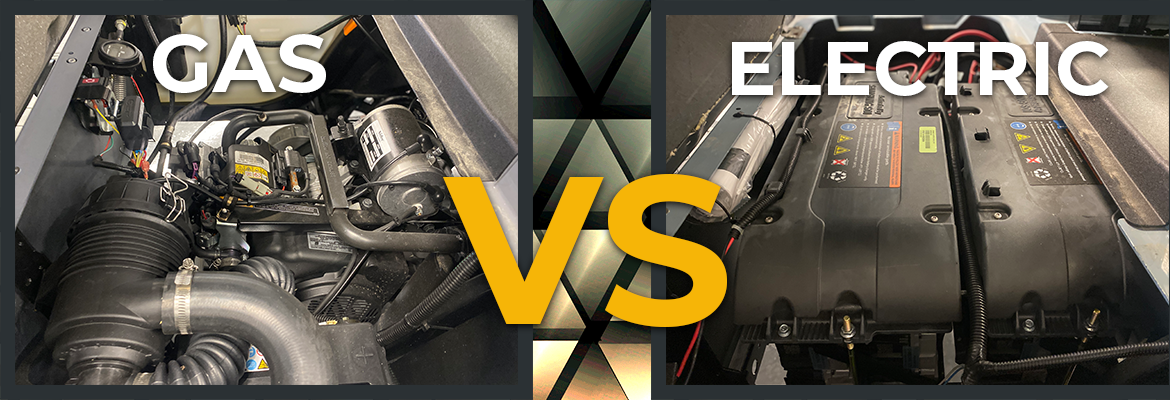
Gas Golf Carts verse Electric Golf Carts
Gas vs. Electric Golf Carts: Choosing Your Eco-Friendly Ride
Golf carts are no longer just for the course. They're becoming a popular choice for cruising around neighborhoods, exploring campuses, and even tackling light utility tasks. But with two main power sources – gas and electric – deciding which type of golf cart is right for you can be a headscratcher. Let's delve into the world of gas and electric golf carts, including the new wave of lithium-ion technology, to help you make an informed choice.
Gasin' Up: The All-American Ride
Gas-powered golf carts have been the traditional choice for decades. They offer several advantages:
- Power and Range: Gas carts typically have more power and a longer range than electric carts, making them ideal for larger properties or frequent extended use.
- Fast Refueling: Filling up a gas tank is quick and easy, minimizing downtime compared to recharging an electric battery.
- Familiar Operation: For those comfortable with gas-powered vehicles, operating a gas golf cart requires minimal adjustment.
However, gas carts also come with drawbacks:
- Emissions and Noise: They contribute to air pollution and can be noisy, disrupting the peace and quiet.
- Maintenance Needs: Gas engines require regular maintenance, such as oil changes and spark plug replacements, adding to the cost of ownership.
- Higher Running Costs: Gas prices fluctuate, and filling up a golf cart can add up over time.
Electric Avenue: The Quiet and Clean Option
Electric golf carts are rapidly gaining popularity due to their eco-friendly nature and ease of use. Here's what makes them so appealing:
- Environmentally Friendly: Electric carts produce zero emissions, making them a guilt-free choice for environmentally conscious consumers.
- Quiet Operation: They run silently, allowing you to enjoy a peaceful ride and avoid disturbing others.
- Low Maintenance: Electric motors require minimal maintenance, saving you time and money in the long run.
- Lower Running Costs: While the upfront cost might be higher, electric carts are significantly cheaper to operate over time, especially with rising gas prices.
However, electric carts also have limitations to consider:
- Range and Charging: Electric carts typically have a shorter range than gas carts and require charging, which can take several hours.
- Power: While sufficient for most uses, electric carts may lack the power of gas carts for tackling steep hills or hauling heavy loads.
The Lithium Revolution: A New Player in the Game
The world of electric golf carts is undergoing a transformation with the introduction of lithium-ion batteries. Here's how lithium compares to traditional lead-acid batteries:
- Lighter Weight: Lithium batteries are significantly lighter than lead-acid batteries, leading to improved performance and range.
- Longer Lifespan: Lithium batteries last longer than lead-acid batteries, requiring replacement less frequently.
- Faster Charging: Lithium batteries can be recharged much faster than lead-acid batteries, minimizing downtime.
- Deeper Discharges: Lithium batteries can be discharged to a lower level before needing recharge, offering more usable power.
While lithium batteries offer numerous advantages, they typically come with a higher initial cost compared to lead-acid batteries. However, the longer lifespan, faster charging times, and potential for increased range can offset the upfront cost over time.
The Final Drive: Choosing Your Perfect Ride
So, which type of golf cart is right for you? Here's a quick breakdown to help you decide:
- Choose gas if: You need a powerful cart for extensive use on large properties, prioritize quick refueling, and are comfortable with gas-powered vehicles.
- Choose electric with lead-acid batteries if: You prioritize a quiet, eco-friendly ride, value low maintenance, and your usage patterns fit within the typical range of electric carts.
- Choose electric with lithium batteries if: You desire the benefits of electric carts with extended range, faster charging times, and a longer lifespan for the battery, and are willing to invest in the upfront cost.
Ultimately, the best choice depends on your individual needs and priorities. Consider your typical usage patterns, budget, and environmental concerns to make an informed decision. No matter which you choose, a golf cart can add a fun and convenient element to your life!
 Gas Golf Carts
Gas Golf CartsGas Golf Cars take automobile gas straight from a can or gas station fuel pump. These cars require very little routine maintenance, can be used all day without needing to charge, and do not need any access to a power outlet. They offer more horsepower and may be better suited to handle various electronic accessories. Gas cars tend to run faster and can accommodate a heavier load. Campgrounds are popular landing spots for gas-powered cars.
 Electric Golf Carts
Electric Golf CartsElectric golf cars are powered by a rechargeable battery. The battery requires regular charging and maintenance of water levels. They offer smooth acceleration, silent operation, and no exhaust fumes. These cars are environmentally friendly, as they do not produce emissions. Many golf courses require electric golf cars due to their silent, fume-free operation.
